Introduction
In the rapidly evolving landscape of digital transformation, Microsoft Azure stands out as a cornerstone for organizations seeking to harness the power of cloud computing. This platform not only offers a comprehensive array of services—from computing and analytics to storage and networking—but also empowers businesses to enhance operational efficiency and drive innovation.
As organizations increasingly adopt cloud solutions, understanding the multifaceted capabilities of Azure becomes essential for maintaining a competitive edge. With its robust security measures, seamless integration with existing systems, and advanced analytics tools, Azure positions itself as a vital resource for enterprises aiming to navigate the complexities of modern business challenges.
As 2024 approaches, the insights and strategies surrounding Azure implementation will be pivotal in shaping the future of organizational success in an increasingly digital world.
Understanding Azure for Business: An Overview
Microsoft Azure for Business serves as a crucial computing platform to assist organizations in their digital transformation efforts. Offering a diverse suite of services—spanning computing power, analytics, storage, and networking—Azure for business empowers organizations to optimize operational efficiency, minimize costs, and foster innovation. Notably, recent findings indicate that nearly half of surveyed businesses have transitioned to cloud solutions primarily for disaster recovery purposes, highlighting the platform's critical role in risk management.
The platform boasts 10 products and services, as noted by IntelliPaat, which enhances its credibility as a comprehensive solution provider. Its inherent flexibility allows organizations to dynamically scale their resources according to demand, making Azure for business an attractive option for enterprises of all sizes. Furthermore, the seamless integration of the platform, including Azure for business, with other Microsoft solutions such as Office 365 and Dynamics 365, cultivates a cohesive ecosystem that enhances workflow efficiency and productivity.
The integration of AI-powered tools like Copilot for Microsoft 365 further strengthens the platform's capabilities, providing users with advanced features that streamline operations. As businesses evolve towards increasingly digital solutions, a thorough understanding of the platform's capabilities is essential for maintaining a competitive edge in the marketplace. In 2024, organizations utilizing the platform can expect to harness its latest developments to further amplify their operational effectiveness and drive digital transformation.
Additionally, the recent identification of leading cloud providers for cloud on-ramps in data centers and Google Cloud's impressive 63.7% IaaS growth position the platform favorably within the competitive landscape, underscoring its relevance and market performance.
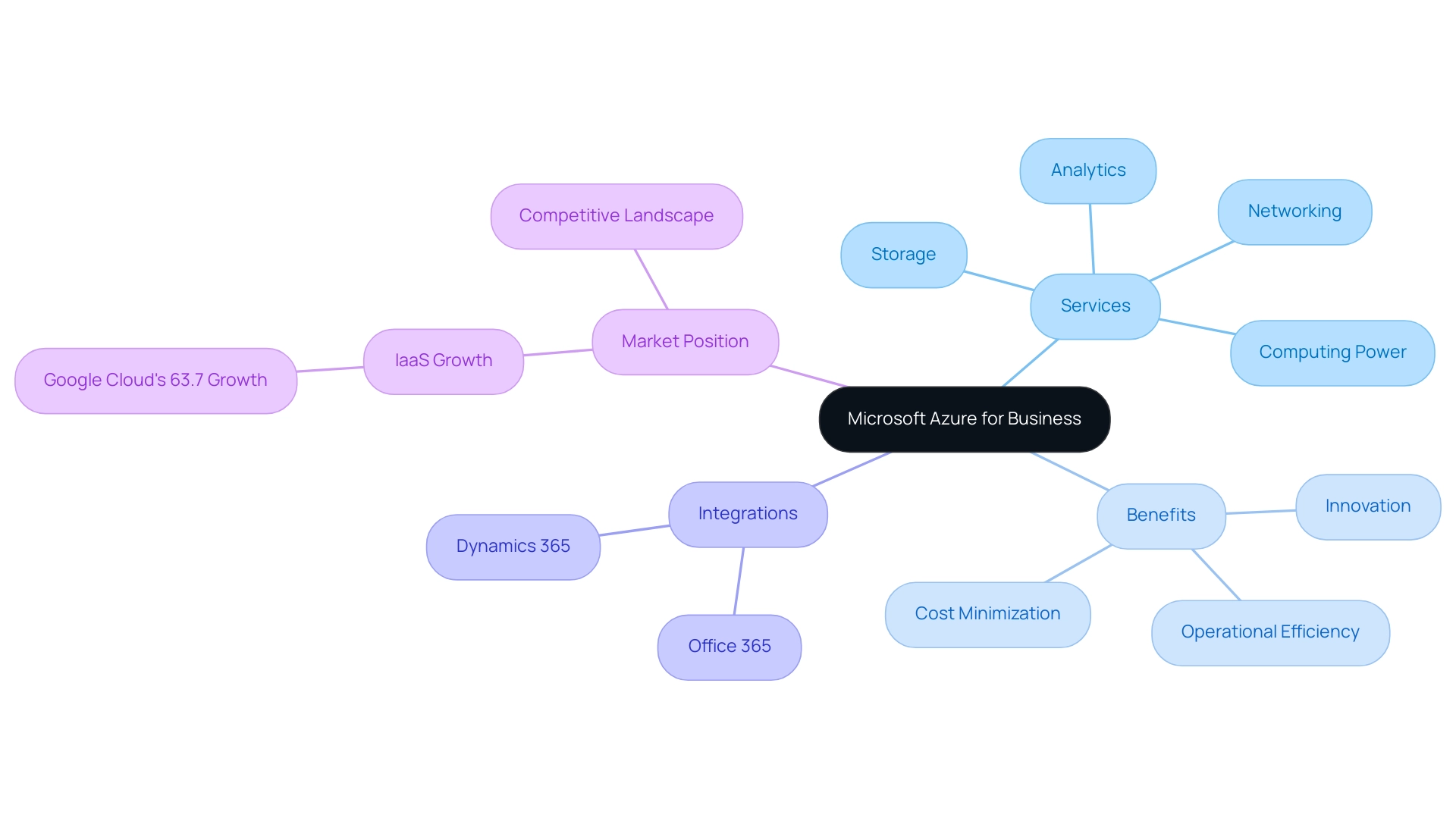
Key Benefits of Azure for Business: Enhancing Efficiency and Innovation
The multitude of key benefits presented by Azure for Business significantly enhance organizational efficiency and drive innovation. One of its standout features is scalability, allowing organizations to dynamically adjust resources according to real-time demands. This flexibility not only optimizes costs—ensuring that entities only pay for what they utilize—but also accommodates fluctuating workloads seamlessly.
In fact, recent reports indicate that scalability of resources is becoming increasingly vital for businesses, with projections for 2024 suggesting that organizations utilizing flexible solutions will outperform their competitors in operational agility. Furthermore, 34% of Top Performers observed that sustainability is a catalyst for boosting budgets for online services, highlighting the platform's role in fostering sustainable practices alongside efficiency.
Security is another cornerstone of the platform's value proposition. With advanced security features such as threat detection, encryption, and adherence to global compliance standards, the platform effectively safeguards sensitive data against emerging cyber threats. As data centers at present account for approximately 1% of global energy consumption, the efficient management of resources is critical.
Business executives have acknowledged this, with Cody Slingerland highlighting,
Together, these two areas represent 82% of the global computing infrastructure,
stressing the significance of strong digital frameworks in a competitive marketplace. Furthermore, the platform enables effortless integration with existing systems, permitting enterprises to optimize their current investments while transitioning smoothly to a digital-centric environment. This integration not only minimizes disruption but also enhances operational continuity.
The Practitioner’s Guide to Scaling Infrastructure as Code is available for download, providing CTOs with practical resources for effective implementation in the cloud.
Additionally, the platform's powerful analytics tools provide organizations with the capability to extract meaningful insights from their data. This data-driven approach empowers informed decision-making, fostering a culture of innovation. By embracing the Azure for Business platform from Microsoft, organizations can not only enhance their operational effectiveness but also strategically align themselves for future expansion in a progressively digital environment, utilizing online services and AI as key resources that foster success and generate value from information.
For instance, the case study titled 'Strategic Asset Utilization of Cloud and AI' illustrates how top performers view cloud and AI not just as operational tools but as strategic assets that drive business success.
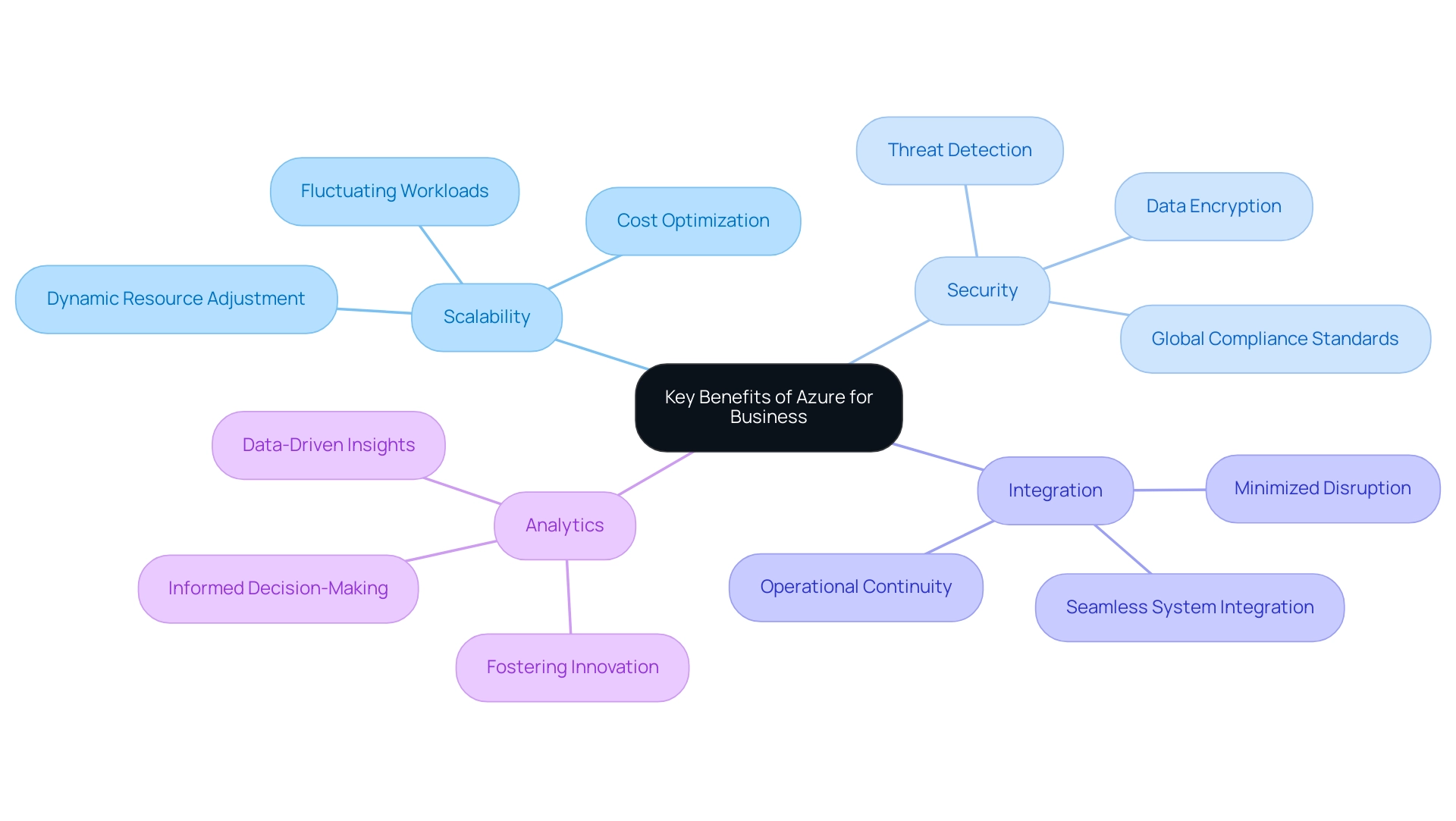
Key Features of Azure: A Deep Dive
Microsoft's cloud platform, known as Azure for Business, offers a comprehensive suite of features designed to address the multifaceted needs of modern enterprises. Leading the way are Virtual Machines, which enable companies to implement and oversee virtualized computing resources effectively. As reported for 2024, a significant share of global organizations, projected at 60%, are expected to utilize these virtual machines, reflecting their critical role in cloud infrastructure.
Complementing this, App Services streamline the development and hosting of web applications, facilitating rapid deployment and scalability tailored to business demands. Furthermore, the SQL Database stands out as a managed service, delivering exceptional scalability and high availability, vital for enterprise operations.
The platform also boasts advanced analytics capabilities through Synapse Analytics, enabling organizations to process and analyze vast amounts of data with remarkable speed and accuracy. The incorporation of AI and machine learning within the platform further enables enterprises to develop intelligent applications, significantly improving customer experiences and encouraging innovation. As Lionel Sujay Vailshery, a research expert in cloud computing, states, "The strategic alliance between OpenAI and Microsoft is a game-changer in the realm of AI and cloud computing."
By leveraging the robust features of Azure for Business, organizations can strategically optimize their operations, ensuring alignment with their overarching goals and objectives. Additionally, a recent case study highlights how users can identify the exact VM size and image type they have deployed, aiding in resource management and billing, which underscores the practical benefits of the platform's offerings.
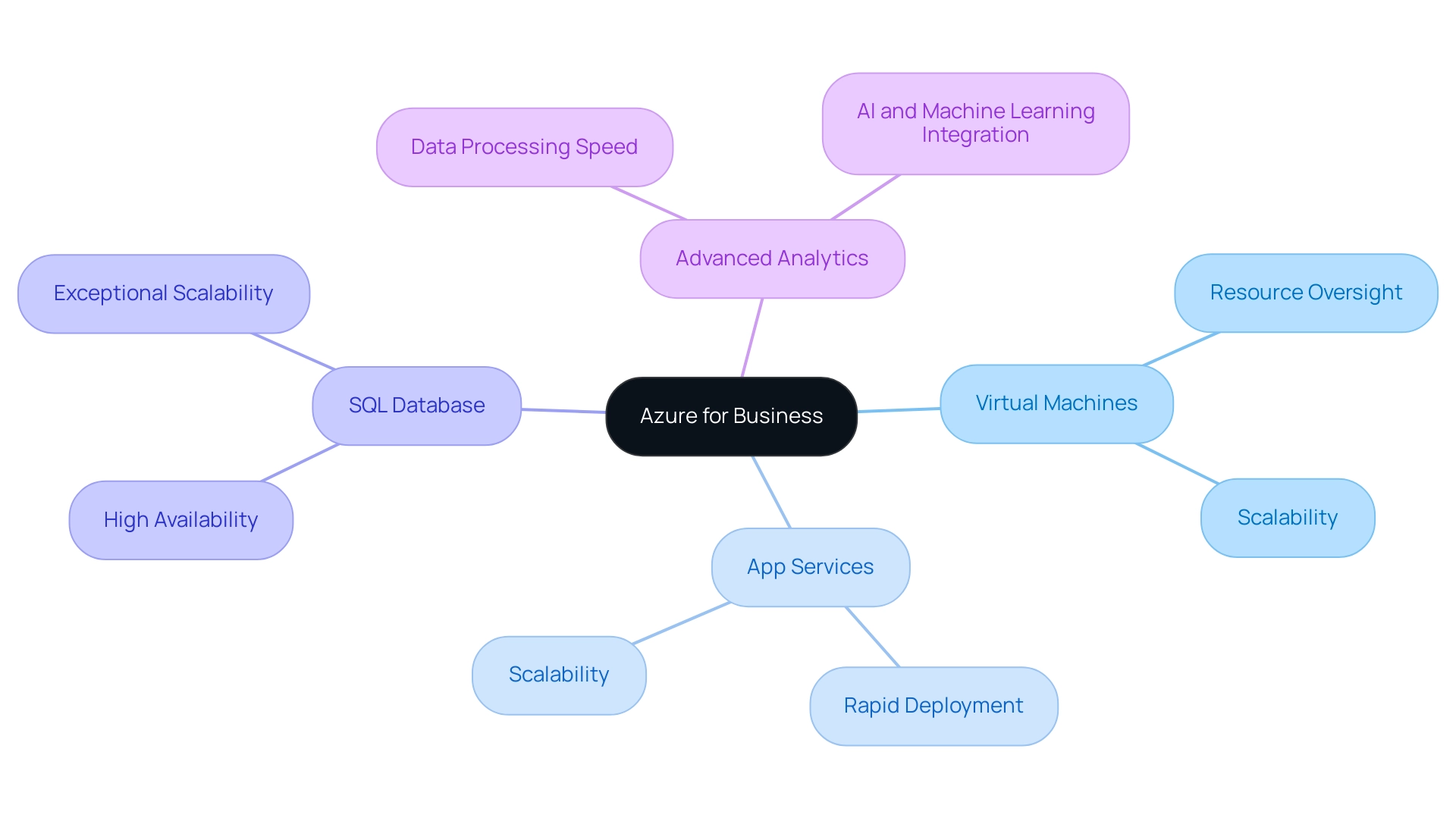
Security and Compliance in Azure: Safeguarding Business Data
Security continues to be a top priority for Microsoft, which incorporates various protective layers aimed at safeguarding organizational data effectively. Among its advanced security measures are:
- Multi-factor authentication
- Comprehensive encryption protocols both at rest and in transit
- Continuous threat monitoring systems that swiftly detect and respond to potential vulnerabilities
As emphasized in the 2023 Thales Security Report, 39% of businesses reported experiencing a data breach in their online environment, underscoring the critical need for robust security solutions.
The platform's commitment to compliance is reflected in its adherence to various global standards and regulations, including:
- GDPR
- HIPAA
- ISO 27001
These frameworks not only ensure that sensitive information is managed responsibly but also bolster organizational trust in the platform. Furthermore, with over 50% of sensitive data assets in the cloud being accessed by five to ten applications, the security measures are essential in protecting these critical assets.
Establishing a zero trust security model is key, which involves implementing network segmentation practices and defining software-based micro-segmentation to enhance security. The Security Center plays a pivotal role in this ecosystem, offering businesses a centralized dashboard to oversee their security posture, thus empowering them to proactively manage risks and maintain compliance. A case study titled 'The Zero Trust Approach' illustrates how investing in zero trust security can lead to significant cost savings per incident while enhancing the overall security posture of entities in hybrid and multi-cloud environments.
By prioritizing security and compliance, the platform enables companies to embrace cloud technologies with confidence while simultaneously mitigating potential risks.
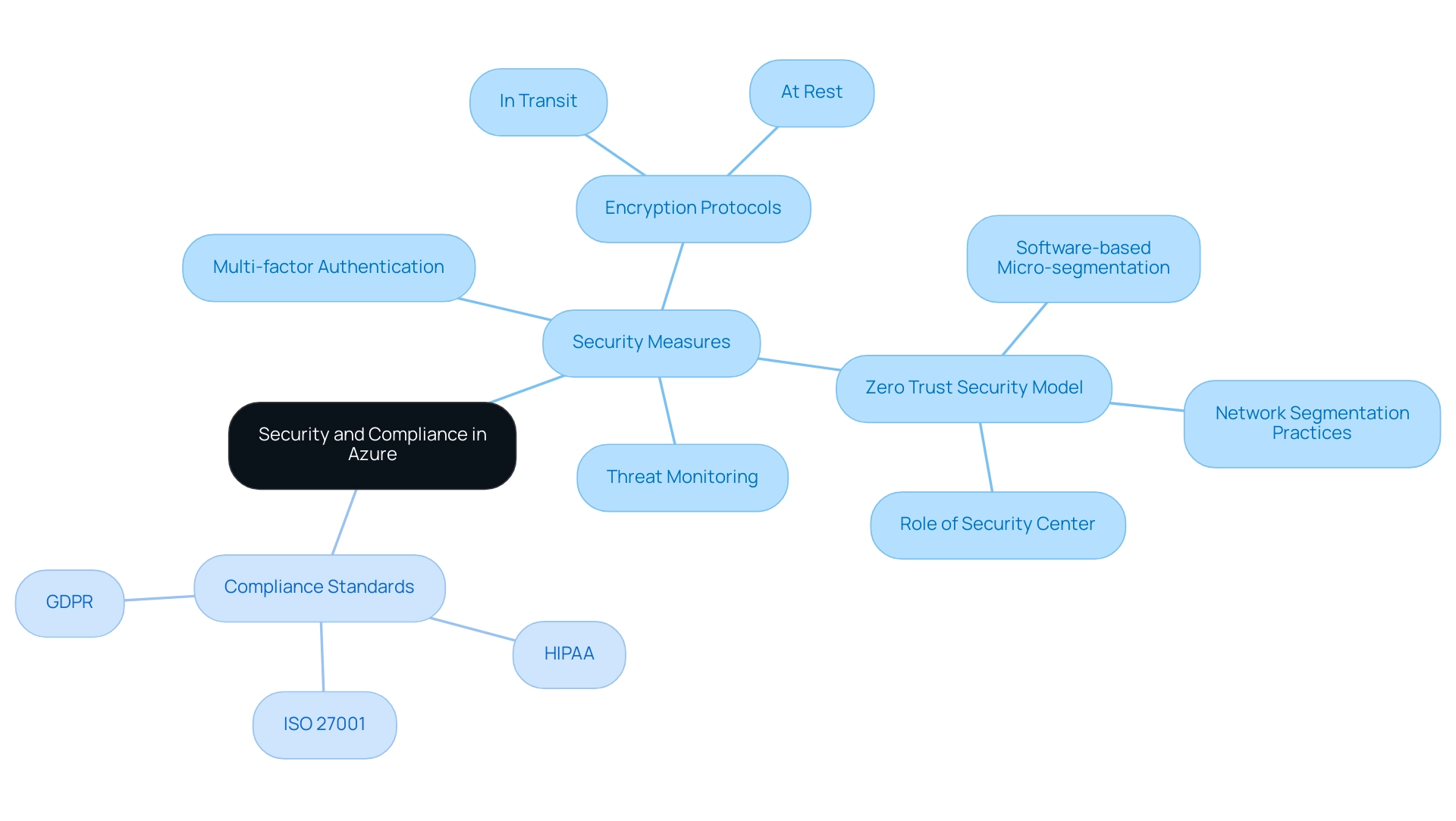
Getting Started with Azure: Implementation Strategies
Integrating the cloud platform within an organization necessitates meticulous planning and execution. It starts with a comprehensive evaluation of the existing IT infrastructure to pinpoint areas where it can greatly improve operational efficiency and value. Establishing clear objectives for migration is crucial, whether these aim at improving scalability, bolstering security, or reducing operational costs.
Engaging professionals certified in Azure for business is highly recommended to ensure that the implementation adheres to industry best practices, thereby minimizing risks associated with cloud migration. Furthermore, utilizing Monitor and Sentinel to automate the detection of anomalies is essential for maintaining operational integrity and security throughout the migration process. Training staff on the extensive tools and features of the platform is also vital; this investment in human capital maximizes its potential and ensures a smoother transition.
As a best practice, it is advisable to update statistics on date columns daily after data loading or transformation to maintain accuracy and relevance. The case study titled 'Statistics Metadata' illustrates the effective use of system views and functions to gather information about statistics, ensuring that they remain current and relevant. By adopting a strategic approach to implementing Azure for business, organizations can effectively navigate the migration process, ultimately unlocking the vast benefits of cloud technology.
Additionally, organizations like Trusted Tech Team play a pivotal role in supporting clients' businesses, reinforcing the importance of community support in the IT sector.
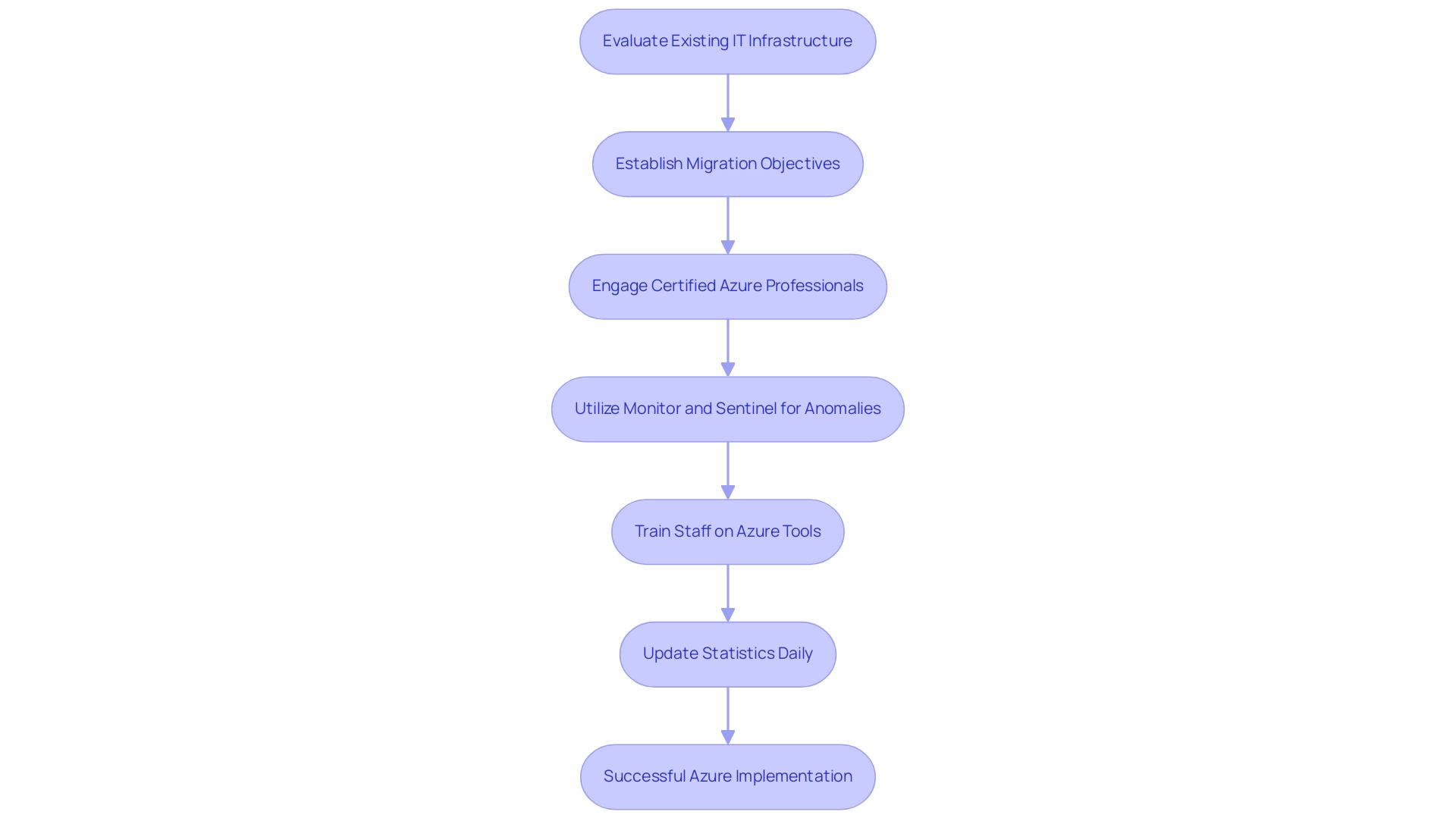
Conclusion
Harnessing the power of Microsoft Azure presents a transformative opportunity for organizations navigating the complexities of digital transformation. Throughout the discussion, key advantages such as:
- Scalability
- Security
- Seamless integration with existing systems
have been highlighted as essential components for driving efficiency and fostering innovation. Azure not only supports businesses in optimizing operational costs but also positions them favorably within a competitive landscape increasingly reliant on cloud solutions.
The robust security measures embedded within Azure, including advanced encryption and compliance with global standards, ensure that organizations can safeguard sensitive data while embracing digital advancements. Furthermore, the analytics capabilities empower enterprises to extract valuable insights from their data, enabling informed decision-making and strategic growth.
As 2024 approaches, the imperative for organizations to understand and leverage Azure's multifaceted offerings becomes increasingly clear. By implementing Azure thoughtfully and strategically, businesses can unlock its full potential, ultimately enhancing their operational effectiveness and paving the way for sustained success in an ever-evolving digital world. Embracing this cloud platform is not merely a technological upgrade; it is a strategic decision that can shape the future trajectory of an organization, reinforcing the need for businesses to prioritize their cloud journey.




